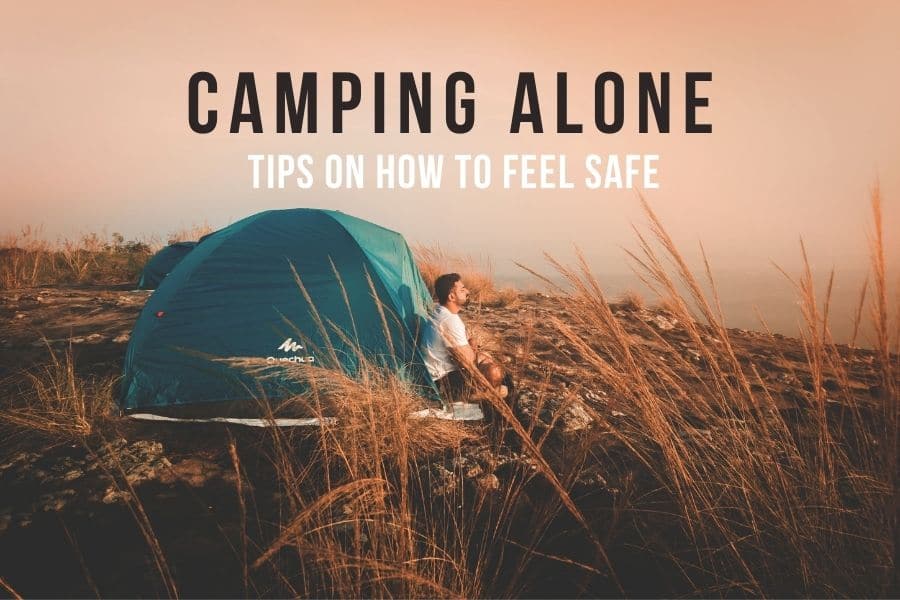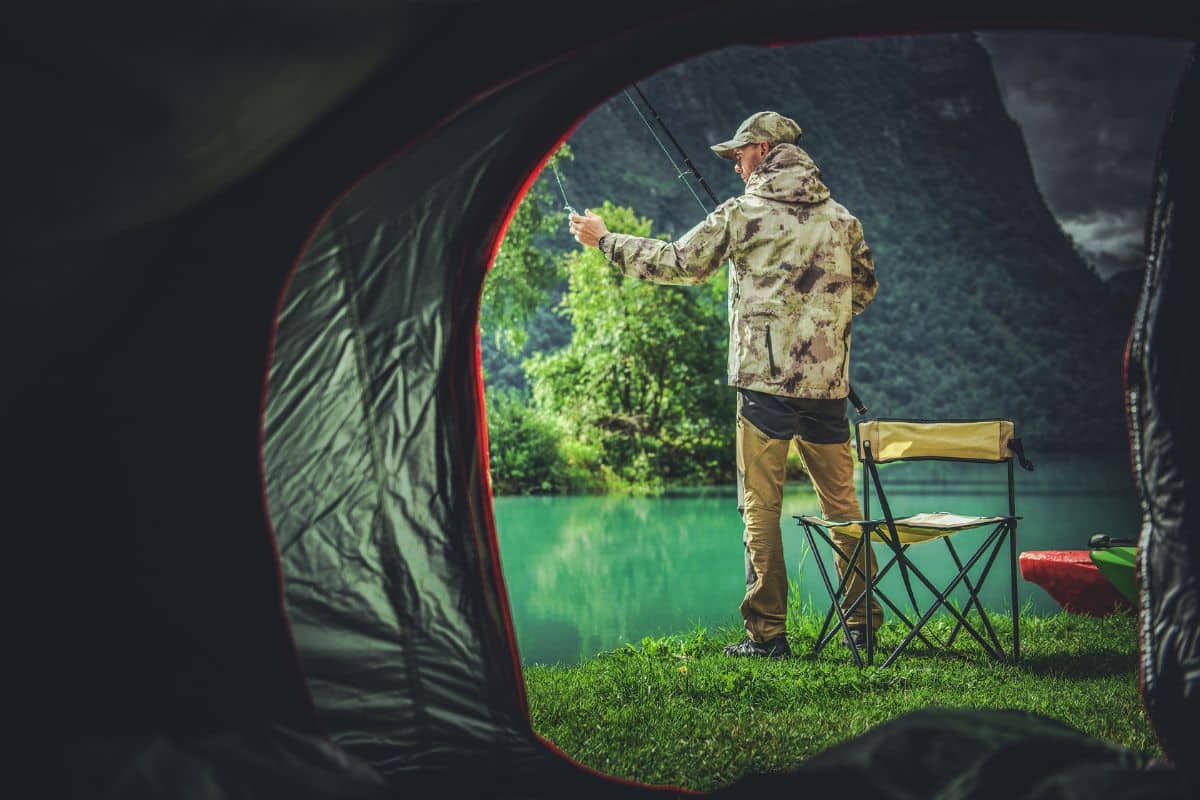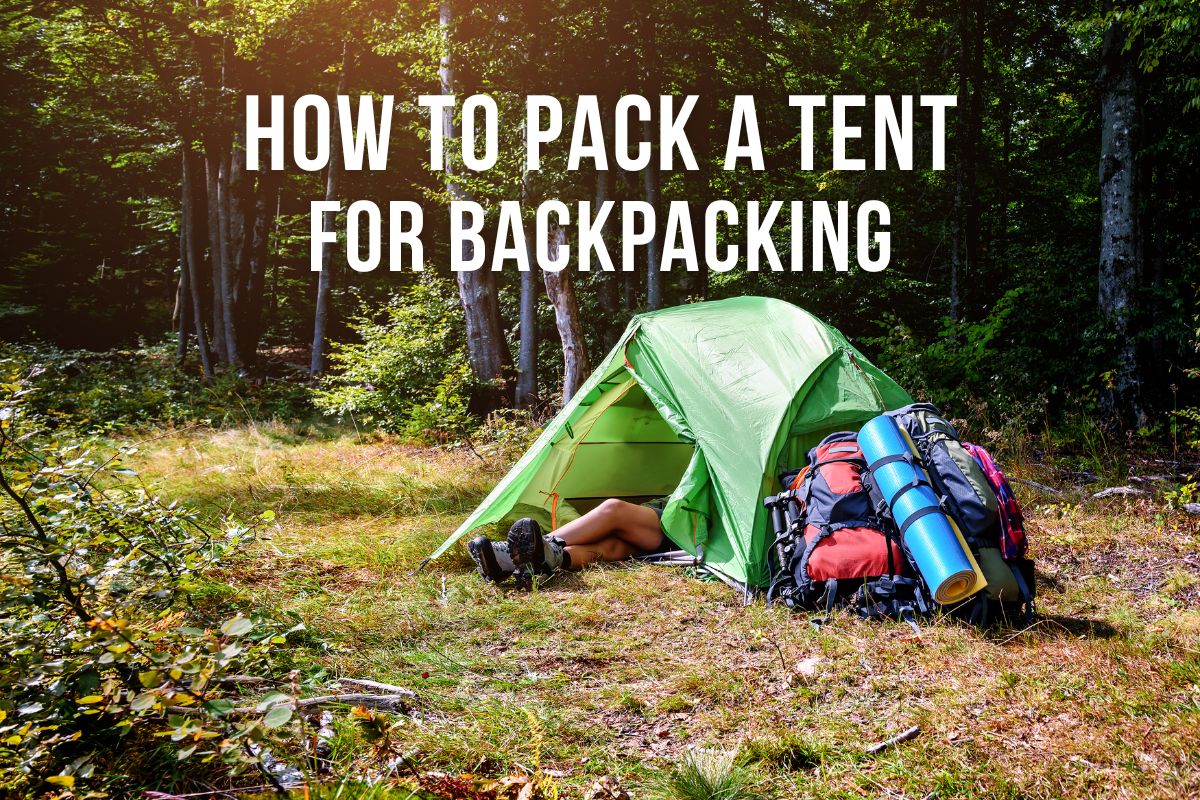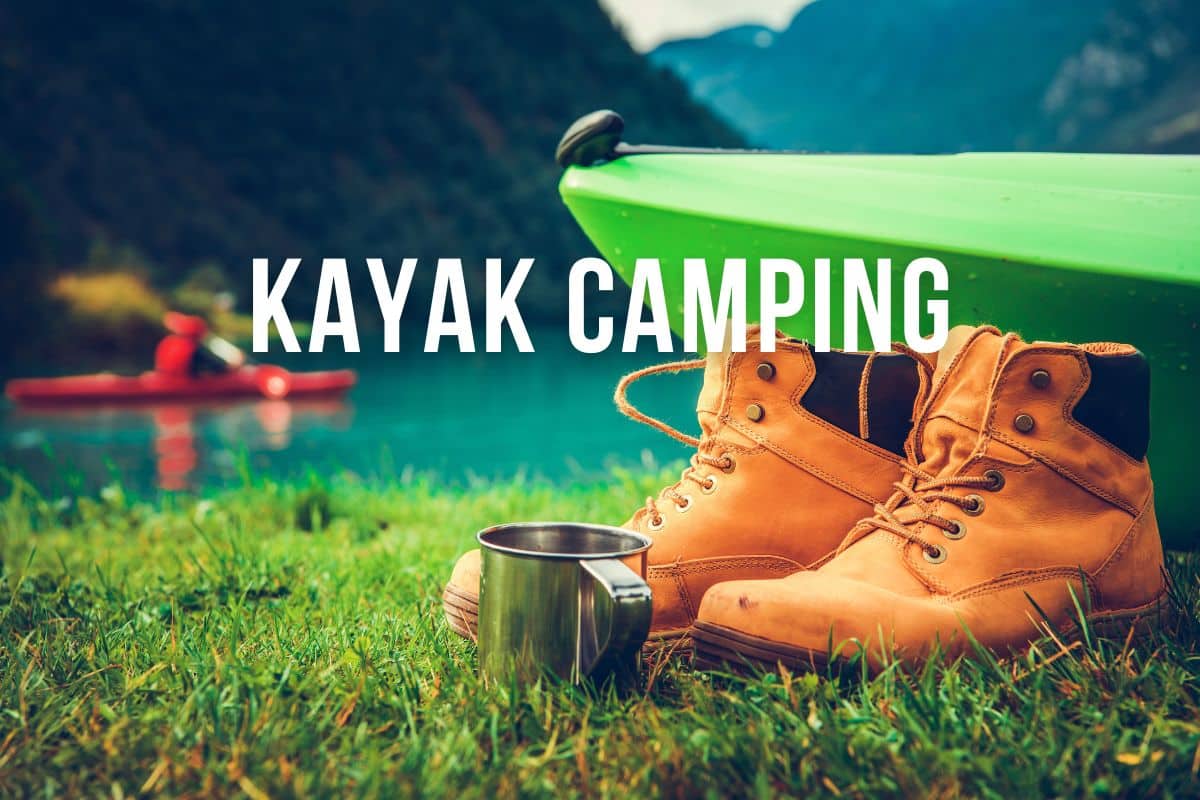Nobody can disagree that wild camping with friends and family is a beautiful experience that involves a lot of fun and wonderful memories. However, sometimes some of us feel the urge to take some time away from ourselves. Do you also feel the same? Don’t worry, you are not the only one.
Camping alone has its benefits. You get to experience nature and landscape at your own pace and time without constantly trying to keep up with other people. You also get to learn a lot of new things when going alone camping which allows you to push and bend your self-created boundaries. But, is it safe to camp alone?
The common myth which we all have been hearing is “Camping alone is not safe”. Camping alone is not unsafe if you stay careful. So, how to stay careful, then? In this article, we will be talking about the different ways to stay careful and how to stay safe when wild camping alone. Let’s get right into it!
Disclosure: This article features affiliate links, including Amazon.com. If you decide to buy through one of these links, I’ll earn a small commission at no extra expense to you. For more details, please see my disclosure policy.
Doing Proper Preparations Before Going Out

Like people say, “Prevention is better than cure”. So it’s always better to plan ahead and make proper preparations. It’s even crucial when you’re camping alone for the first time.
Now, what do we exactly mean by “proper preparations”? Well, besides wild camping essentials, first aid kits, food, and water, you have to add more things to your preparation list. There can be a lot of different definitions to explain that, however, we have managed to narrow them down into the following categories:
1. Master camping and navigation skills
As you will be going out camping alone, you must be aware of basic skills like pitching a tent and building a fire. If you are a beginner, it is highly recommended to get some practice first. In case you are planning to go to some remote place, you must learn to use a compass and always carry a map with you. That way, you will be able to navigate through dense forests or rocky mountains even if you don’t have cell coverage.
2. Carry some medicines and antibiotics
We all know the importance of a first aid kit and it is something that you must carry at all times. A first aid kit will be very handy in case of an injury but what about other conditions? Into the wilderness, you will be exposed to a completely different atmosphere. So, despite having a strong immune system, there’s always a chance of catching a cold.
The food and water quality will also be different from your regular diet so it’s common to have stomach problems on your camping trip. That is the reason why you should always bring some medicines along with your basic first aid kit. After all, a few extra pills won’t be too much to carry, right?
3. Don’t forget your entertainment

Going on a camping trip alone, you would want to spend your time staying attached to nature. However, most of us are quite accustomed to busy city lives so often it becomes difficult to sit idle for a long time.
During the evening, you will spend most of your time in your tent so it’s good to bring something for your entertainment. It can be anything like a book or journal or just your phone or tablet. You can also listen to music or audiobooks to avoid the creepy noises of the forest.
Share your plans
The most important thing is to share your plan with people whom you trust. By sharing, it doesn’t mean to advertise your location and details on social media from time to time. Instead, choose 1-2 trusted people who will be there for you in the time of your need and tell them all the necessary details.
That includes your date of departure, date of arrival, camping location, and other minute details including your license plate number and personal description. If you are careful, it’s unlikely you would come across any trouble. But just in case things go out of hand, you would have someone to count on.
Finding a Proper Spot while Camping Alone
Now, this one’s important. You will find thousands of articles telling you which is the best camping spot, but none of them will be personalized as per your needs. We all live different lives and have different lifestyles so there’s no hard and fast rule for finding your ideal camping spot. With that said, let’s take a look at the basics of choosing your camping spot of the dreams.
1. Find your comfort zone

Not many of us are used to sudden changes in weather and climate and oftentimes we find it difficult to adjust to the surroundings. It’s always better to find a campsite which most suits you.
For example, if you are not a good swimmer, you should never place your tent near any fast-flowing water body. We also recommend you follow the 60 meters (200 feet) rule which simply means that you should put your tent 60 meters away from nearby trails to prevent hikers from running into your tent.
2. Analyze your campground
Even if you are not a pro, you should check a few things before you start unpacking your gear. First and most obvious in getting a comfortable night’s sleep is to find a flat and clear surface. The rule of thumb is if the place doesn’t look good, then it isn’t comfortable. So, just go follow your instincts and you will be good to go.
Also, the orientation of the door of the tent should face the sun and you will feel the warmth of the sun, first thing in the morning. Check for shelter and windbreaks too. A boulder, ridge, rocks, or even small crops of trees will be perfect for the cover.
3. Get away from toilets in highly trafficked areas
Your first thought might be to place your tent near a toilet so you don’t have to take a long walk in the middle of the night searching for toilets. That makes sense but consider this. You are in the middle of a busy campsite flocked with hundreds of people. So, it’s not unnatural that many people will use the toilet at night.
And, if you are a light sleeper, you might be disturbed several times during the night and we all are aware of the fact that sleep is important for a memorable hiking trip. So, it’s better to just stay away from public places like toilets unless you need to use them frequently at night.
4. Don’t bite off more than you can chew
Many regular campers will tell you to plan your first trip for three-four or even five days long. The reason is it will help you to get the hang of things as you spend more time in nature. From their perspective, this sounds like a good tip. However, we will recommend you to take things slow. Your first camping trip alone should not be more than one-two days.
Why do we say this? Well, even if you badly want to leave the city life and spend more time with nature, you will start to feel a little lonely or bored by the end of Day 3 or Day 4. The feeling of loneliness might end up messing up with your brain and eventually with your whole trip. A one-day trip will give you the basic ideas of camping alone, and also will keep your mind clear and stress-free.

Stay Safe From Wildlife And Strangers
On a solo camping trip, you are the only guardian of yourself. So in order to stay safe and sound, you have to take mandatory precautions. That includes staying away from both wild animals and strangers as well.
The “away from wild animals” partly explains itself but the” away from strangers” part is a little controversial. I’m not saying that you should not interact with other people. What we are trying to imply is to be careful and try to maintain a distance from suspicious people. Let’s talk about this in more detail.
1. Avoid excess interaction with strangers
First things first, you should avoid posting your location and trip details on social media before you arrive back home. For you, it might be a good picture or video, but for a wrongdoer, it is a potential invite for creating mischief.
The second thing, say no! When camping alone, there will be instances when you come across people who might ask for help or just to share your table. If you have a bad gut feeling, just say no. Even if you are slightly uncomfortable. Don’t try to think of silly excuses, it will only make things difficult for you. You might sound rude but it doesn’t matter what they think of you. They are strangers who have little meaning in your life.
2. Avoid wildlife
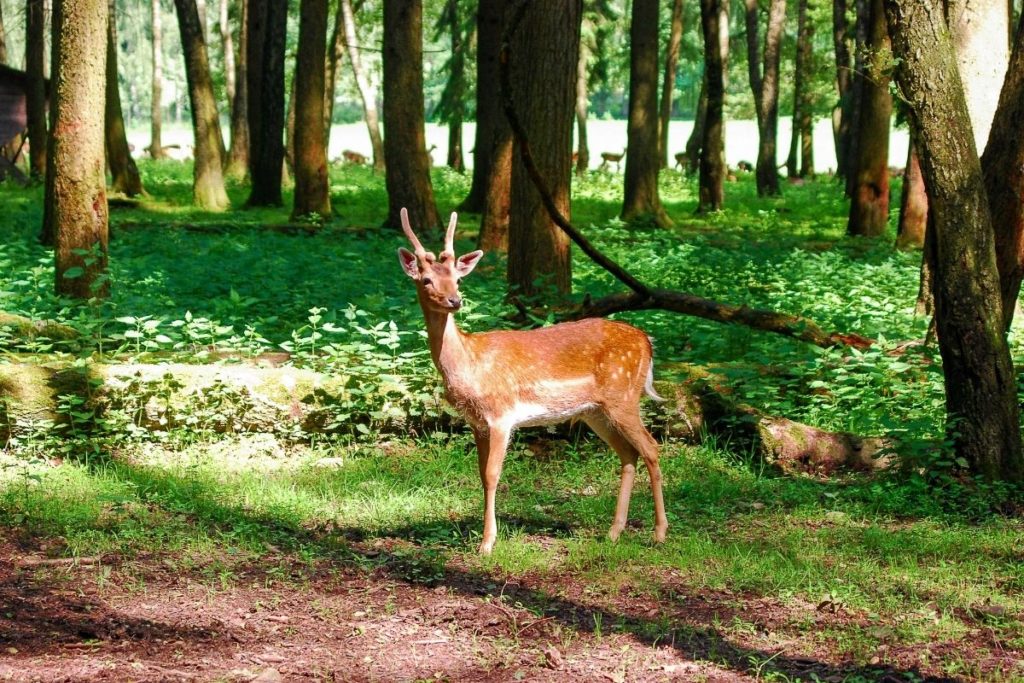
Getting deep into the wilderness, you need to take extra care of wild animals. You can carry bear sprays and air horns with you to protect yourself from wild bears. On your campsite, light campfires as most animals are afraid of fire.
Bug sprays and mosquito repellents should also be in your backpack. Look for ant nests and try to stay away from them. A blinding flashlight is a must to carry as it will give you visibility at night and it can stop an animal or a human dead in his tracks by blinding him.
Besides the above discussed, you can experiment and find other methods to keep animals and insects away from your campsite. Animals don’t attack unless being threatened so be sure not to mess with them. However, it is also necessary to look at the well-being of the animals so make sure that you don’t leave any trash behind.
3. Avoid eating every fruit you see
You should not eat anything from inside the jungle unless you are aware of what you are doing. It’s always better to research and read about the natural flora and fauna of the habitat which you will be visiting for your solo camping trip.
Be sure you have ample knowledge about the do’s and don’ts of the region and don’t forget to carry anti-allergy pills if you have any.
*Pro-tip: If you are going to a national park or reserve, try to get in touch and befriend the park rangers. If possible, get someone’s number, it might come in handy.

Conclusion
We have now reached the end of this article. Throughout this article, we talked about safety standards and tips to stay safe when camping alone. But again, these are just basic and general methods and for implementing them in your alone camping trip, don’t be shy to make any changes. Keep in mind, not to be too much obsessed with your safety and be present with the surroundings.
Trust me when I say this, as you go back to your daily routine, you will miss the lovely moments of your trip, so you have to keep yourself safe without cutting short on your experience. Thanks for reading and happy camping!
About the Author
Hussain from Hikers Needs is a passionate hiker and traveler that loves the outdoors and enjoys what nature has to give, whenever he can he loves to write and give tips & honest reviews to help others get out there and just seek more unforgettable experiences.
PIN IT
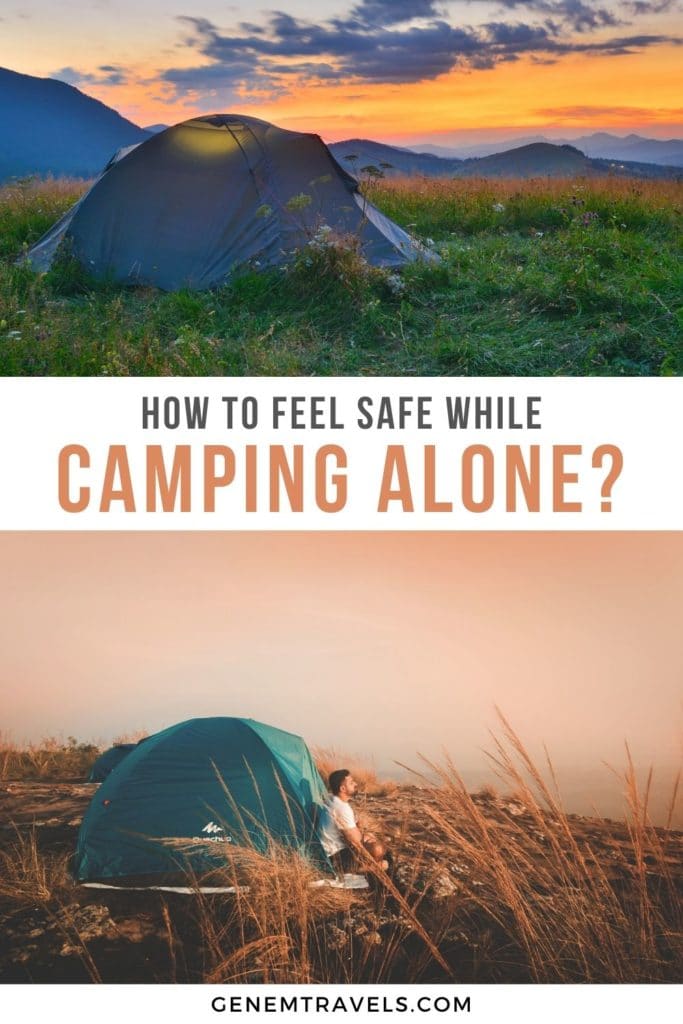
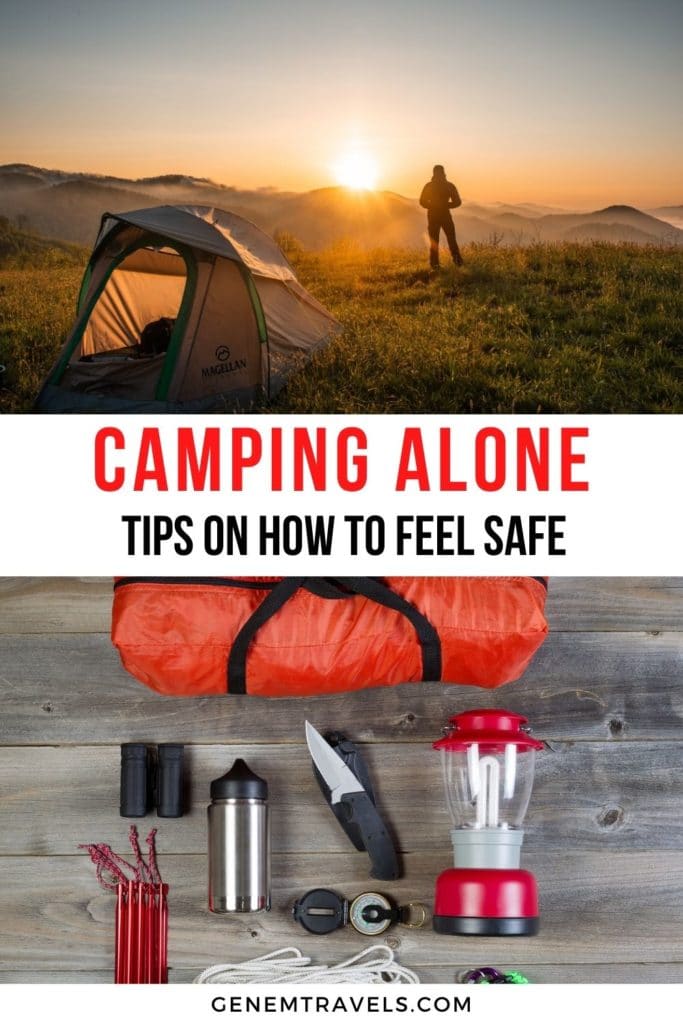
Read more about Adventure travel:
